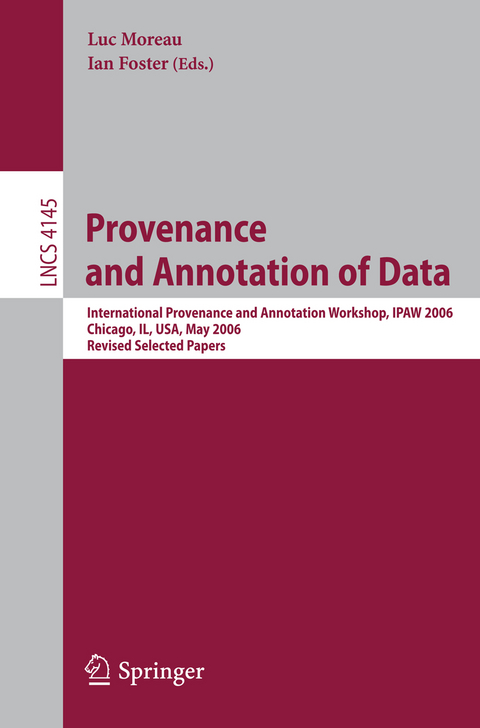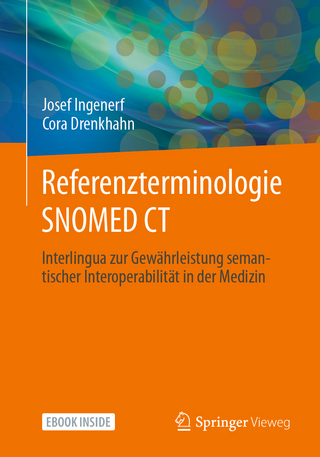
Provenance and Annotation of Data
Springer Berlin (Verlag)
978-3-540-46302-3 (ISBN)
This book constitutes the thoroughly referred postproceeding of the International Provenance and Annotation Workshops, IPAW 2006, held in Chicago, Il, USA in May 2006. The 26 revised full papers presented together with 2 keynote papers were carefully selected for presentation during two rounds of reviewing and improvement. The paper are organized in topical sections on applications in software development, organ transplantation management, scientific simulation, stream filtering, and e-science; data semantics and semantic Web; workflows; models of provenance, annotations, and processes; and provenance systems.
Session 1: Keynotes.- Automatic Generation of Workflow Provenance.- Managing Rapidly-Evolving Scientific Workflows.- Session 2: Applications.- Virtual Logbooks and Collaboration in Science and Software Development.- Applying Provenance in Distributed Organ Transplant Management.- Provenance Implementation in a Scientific Simulation Environment.- Towards Low Overhead Provenance Tracking in Near Real-Time Stream Filtering.- Enabling Provenance on Large Scale e-Science Applications.- Session 4: Semantics 1.- Harvesting RDF Triples.- Mapping Physical Formats to Logical Models to Extract Data and Metadata: The Defuddle Parsing Engine.- Annotation and Provenance Tracking in Semantic Web Photo Libraries.- Metadata Catalogs with Semantic Representations.- Combining Provenance with Trust in Social Networks for Semantic Web Content Filtering.- Session 5: Workflow.- Recording Actor State in Scientific Workflows.- Provenance Collection Support in the Kepler Scientific Workflow System.- A Model for User-Oriented Data Provenance in Pipelined Scientific Workflows.- Applying the Virtual Data Provenance Model.- Session 6: Models of Provenance, Annotations and Processes.- A Provenance Model for Manually Curated Data.- Issues in Automatic Provenance Collection.- Electronically Querying for the Provenance of Entities.- AstroDAS: Sharing Assertions Across Astronomy Catalogues Through Distributed Annotation.- Session 8: Systems.- Security Issues in a SOA-Based Provenance System.- Implementing a Secure Annotation Service.- Performance Evaluation of the Karma Provenance Framework for Scientific Workflows.- Exploring Provenance in a Distributed Job Execution System.- gLite Job Provenance.- Session 9: Semantics 2.- An Identity Crisis in the Life Sciences.- CombeChem: A Case Study in Provenance and Annotation Using the Semantic Web.- Principles of High Quality Documentation for Provenance: A Philosophical Discussion.
| Erscheint lt. Verlag | 27.9.2006 |
|---|---|
| Reihe/Serie | Information Systems and Applications, incl. Internet/Web, and HCI | Lecture Notes in Computer Science |
| Zusatzinfo | XII, 292 p. |
| Verlagsort | Berlin |
| Sprache | englisch |
| Maße | 155 x 235 mm |
| Gewicht | 960 g |
| Themenwelt | Informatik ► Theorie / Studium ► Algorithmen |
| Schlagworte | data annotation • data derivation • data provenance • Data Semantics • Identity • information documentation • Metadata Management • Performance • Performance Evaluation • process documentation • process provenance • secure annotation • security • Service Oriented Architecture (SOA) • Simulation • Trust • virtual lofbooks • workflow provenance |
| ISBN-10 | 3-540-46302-X / 354046302X |
| ISBN-13 | 978-3-540-46302-3 / 9783540463023 |
| Zustand | Neuware |
| Haben Sie eine Frage zum Produkt? |
aus dem Bereich


